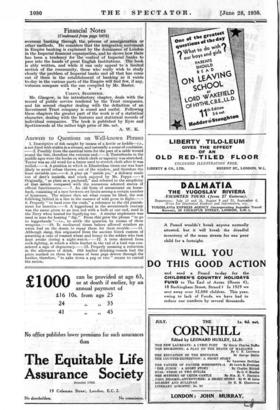Answers to Questions on Well-known Phrases
1. Descriptive of fish caught by means of a kettle or keddle—i.e., a net fixed with stakes in a stream, and naturally a scene of confusion. —2. Possibly from the nautical term for the part of a cable wound round the bitt, therefore the extreme end.-3. Tenterhooks in the middle ages were the hooks on which cloth or tapestry was stretched. Tenter was an old word for a frame used to stretch cloth after it was milled.-4. A position in which in Elizabethan times one was least • likely to avoid refuse thrown out of the window, and therefore the• least enviable one.-5. A play on " umble pie," a delicacy made out of deer's innards, and much enjoyed by Mr. Pepys.— 6 Originally, "as plain as a packstaff," and referred to the simplicity -of that -article compared with the numerous adorned staves of official functionaries. 7. An old form of amusement on horse- back, consisting of a race between set limits among a certain number of horsemen. The winner then set what course he liked, the rest following behind in a line in the manner of wild geese in flight. 8. Properly "to haul over the coals," a reference to the old punish- ment for heretics.-9. A loggerhead in the seventeenth century was the name given to an iron rod with a bulb at one end, used in the Navy when heated for liquifying tar. A similar implement was used in inns for heating "flip." From this grew the phrase "to go to loggerheads "—i.e., to settle the question by means of these weapons.-10. In mediaeval times bakers allowed retailers an extra loaf on the dozen to repay them for their trouble.-11. Although slang, this originated from the ancient Greek custom of awarding a cake of roasted wheat and honey to the soldier who best
kept awake during- a night-watch. 12. A term derived from cock-fighting, in which a white feather in the tail of a bird was con- sidered a sign of degeneracy.-13. Properly meaning a reduction in the allowance of drink. Old leather drinking-vessels had the pints marked on them by means of bone pegs driven through the leather, therefore, "to take down a peg or two " meant to curtail the ration.


















































 Previous page
Previous page